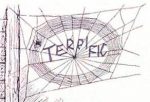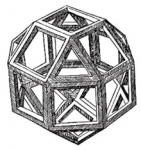I find the relationship between mathematics and vision fascinating. Even within mathematics itself, seeing how the geometric expression of ideas can clarify or further develop countless mathematical thoughts is always worth noting – like the graphs of functions, or the projections of figures. I’ve written before about the relationship between the brain’s visual processes and […]
|
|||||

The slow and steady march toward a more and more precise definition of what we mean by information inevitably begins with Claude Shannon. In 1948 Shannon published The Mathematical Theory of Communication in Bell Labs’ technical journal. Shannon found that transmitted messages could be encoded with just two bursts of voltage – an on burst […] The Riemann Hypothesis came to my attention again recently. More specifically I read a bit about the possibility that quantum mechanical measurements may provide a proof of a centuries-old hypothesis and one of mathematics’ most famous enigmas. Within mathematics itself, without any reference to its physical meaning, the Riemann Hypothesis highlights the kind of […] 
Both Quanta Magazine and New Scientist reported on some renewed interest in an old idea. It was an approach to particle physics, proposed by theoretical physicist Geoffrey Chew in the 1960s, that ignored questions about which particles were most elementary and put a major portion of the weight of discovery on mathematics. […] Not too long ago I wrote about entropy, and what has come to be known as Maxwell’s demon – a hypothetical creature, invented in 1871 by James Clark Maxwell. The creature was the product of a thought experiment meant to explore the possibility of violating the second law of thermodynamics using information to impede entropy […] When I read the subheading in a recent Scientific American article, it brought me back to some 18th century thoughts which I recently reviewed. The subheading of a piece by Clara Moskowitz’s that describes a new effort in theoretical physics reads: Hundreds of researchers in a collaborative project called “It from Qubit” say space and […] In 2011 John Horgan posted a piece on his blog, Cross Check (part of the Scientific American blog network), with the title, Why Information can’t be the basis of reality. There Horgan makes the observation that the “everything-is-information meme violates common sense.” As of last December (at least) he hadn’t changed his mind. He referred […] Quanta magazine has a piece on a recent conference in Munich where scientists and philosophers discussed the history and future of scientific inquiry. The meeting seems to have been mostly motivated by two things. The first of these is found in the diminishing prospects for physics experiments – energy levels that can’t be reached by […] I’ve been reading Rebecca Goldstein’s Incompleteness: The Proof and Paradox of Kurt Gödel which, together with my finding David Mumford’s Why I am a Platonist, has kept me a bit more preoccupied, of late, with Platonism. This is not an entirely new preoccupation. I remember one of my early philosophy teacher’s periodically blurting out, “See, […] Looking through some blog sites that I once frequented (but have recently neglected) I saw that John Horgan’s Cross Check had a piece on George Johnson’s book Fire in the Mind: Science, Faith, and the Search for Order. This quickly caught my attention because Horgan and Johnson figured prominently in my mind in the late […] |
|||||
|
Copyright © 2024 Mathematics Rising - All Rights Reserved Powered by WordPress & Atahualpa |
|||||


Recent Comments